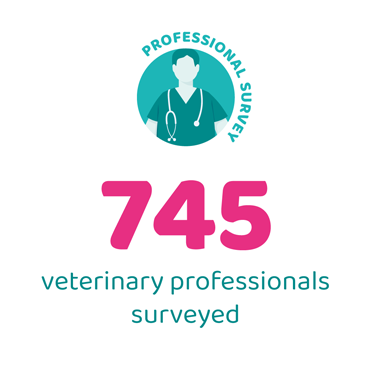The PAW Report is the largest annual survey of pet wellbeing in the UK and is demographically representative of dog, cat and rabbit owners.
By working with YouGov, our annual PDSA Animal Wellbeing (PAW) Report is representative of the UK pet owning population by age, region, ethnicity and species of pet owned. This creates an accurate picture of pet wellbeing across the nation.
The first Report was launched in 2011, giving us 15 years of trend data. This allows us to report on how owners are meeting the 5 Welfare Needs of their pets, share insights from the veterinary profession, and estimate the UK pet dog, cat, and rabbit populations.
Data sources used in the PAW Report:
- Annual nationally representative survey of pet owners
- Surveys of veterinary professionals
- YouGov data on the incidence of pet ownership in the UK (used in the pet population calculations)
- ONS data (used in the pet population calculations)
Annual survey of pet owners
In conjunction with YouGov, each year we survey a large and demographically representative sample of UK dog, cat, and rabbit owners using YouGov’s panel methodology.
In the latest PAW Mini Report 2025, the survey sample totalled 5,387 cat, dog, and rabbit owners aged 18 and over, living in the UK. Therefore, when referring to ‘owners’ throughout the Report, we’re specifically discussing cat, dog, and rabbit owners – not owners of other types of pets.
The majority of questions require owners to pick one or more options from a list of enter a text response. One question for rabbit owners asks them to choose which of a selection of six images most closely resembles where their rabbit lives.
In 2025, data was gathered between 17 December 2024 and 12 January 2025 through an online survey. Demographic quotas were set to ensure the data collected was as nationally representative as possible, and any small errors in the final sample were corrected through weighting (where necessary). The demographic quotas and weighting used in this method are determined by a separate YouGov panel survey of 10,000 UK adults, which provides demographic information such as regional breakdowns and age and gender profiles of owners.
Survey of veterinary professionals
Periodically we survey veterinary professionals online via an open survey. We last repeated this survey in 2023 and collected responses from 745 veterinary surgeons, veterinary nurses, students, nursing support staff, veterinary academics, practice owners, partners and managers.
Fieldwork was undertaken between 6 January and 13 February 2023, hosted by YouGov using an open link. Due to the nature of this survey these figures are not collected in line with any demographic quotas or weighted as per the survey of pet owners. Details of the survey are shared via social media and professional networks to encourage participation. Participants are invited to be entered into a prize draw to win a prize.

Pet population calculation
We work with YouGov to annually calculate estimates of the pet dog, cat and rabbit populations. Three data sources are used in this calculation:
- Separate sampling from the YouGov online survey panel to determine the percentage of UK adults who own each species of pets (n=10,000).
- Data from the PAW Report survey of pet owners on the number of pets owned by each owner.
- Data from the Office for National Statistics (ONS) on the number of households.
Data analysis
Data was analysed using YouGov’s tool, Crunch. We use statistical tests to check whether differences between results are meaningful. For example, the number of dog owners getting their pet from a rescue or rehoming centre fell from 22% in 2018 to 17% in 2025. This change is statistically significant, meaning it’s very unlikely to have happened by chance. All percentages in this report are rounded to the nearest whole number.
Further information
Further details of the PAW Report methodology can be found in our peer-reviewed paper published in the Veterinary Record. 'Driving evidence-based improvements for the UK's 'Stressed. Lonely. Overweight. Bored. Aggressive. Misunderstood... but loved' companion animals' (Wensley et al, 2021) is available via open access






